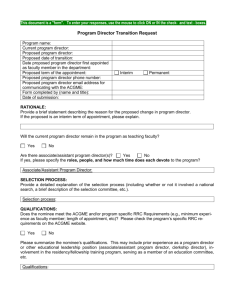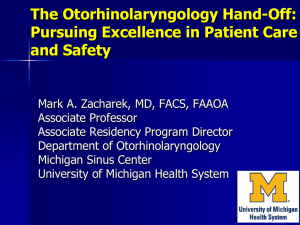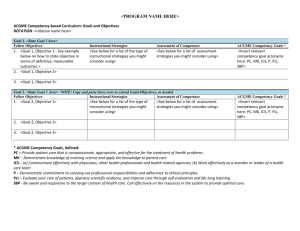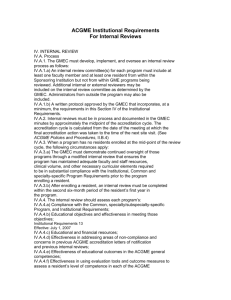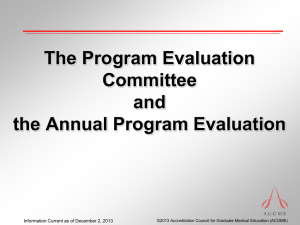Neurological Surgery RC Nominee Materials April 2014
advertisement
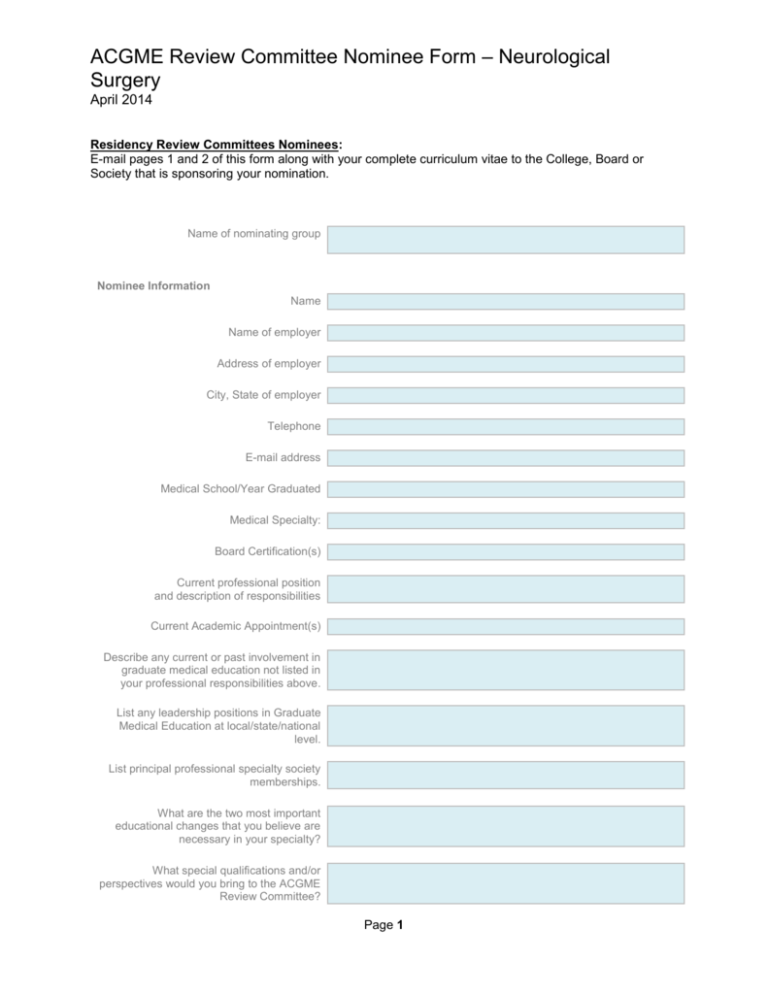
ACGME Review Committee Nominee Form – Neurological Surgery April 2014 Residency Review Committees Nominees: E-mail pages 1 and 2 of this form along with your complete curriculum vitae to the College, Board or Society that is sponsoring your nomination. Name of nominating group Nominee Information Name Name of employer Address of employer City, State of employer Telephone E-mail address Medical School/Year Graduated Medical Specialty: Board Certification(s) Current professional position and description of responsibilities Current Academic Appointment(s) Describe any current or past involvement in graduate medical education not listed in your professional responsibilities above. List any leadership positions in Graduate Medical Education at local/state/national level. List principal professional specialty society memberships. What are the two most important educational changes that you believe are necessary in your specialty? What special qualifications and/or perspectives would you bring to the ACGME Review Committee? Page 1 ACGME Review Committee Nominee Form April 2014 Have you previously served on a Review Committee? If so, list the specialty and duration of service. Page 2 Accreditation Council for Graduate Medical Education Agreement for: Review Committee Members In connection with my membership on a Review Committee of the Accreditation Council for Graduate Medical Education (ACGME), I understand and agree to the following: Review Committee Function I understand that the Review Committee is an ACGME Committee that functions according to ACGME policies and procedures. The Review Committee is not an independent entity, nor does it belong to a specialty. The Review Committee’s function is to establish and revise ACGME accreditation standards, subject to approval by the ACGME, and to provide a peer evaluation of residency programs in its specialty and accompanying subspecialties or of the institutions that sponsor the specialty and subspecialty residency programs. The purpose of the evaluation is to assess whether a program or sponsoring institution substantially complies with ACGME accreditation standards (i.e., program and/or sponsoring institution) and to confer an accreditation status to programs and sponsoring institutions relating to substantial compliance with those standards. Member Term of Appointment My appointment is for a term of six years. Upon completing six years of service, I may not be appointed again to the same Review Committee. The ACGME Bylaws, Article IX. Section 3 states that no employee of a member of the ACGME (AAMC, ABMS, AHA, AMA, CMSS) or any RRC appointing organization shall serve as a voting member of a Review Committee. Should I become an employee of any of these organizations, I will notify the Review Committee Executive Director and resign my position immediately. I understand that the Review Committee Executive Director determines the date my term begins and that, under exceptional circumstances, the date of completion of my term may be adjusted by the Review Committee Executive Director for a brief period to accommodate the needs of the Review Committee. Role and Responsibilities of the Review Committee Executive Director I understand that the Review Committee Executive Director, appointed by the ACGME Executive Director, is the chief staff person for the Review Committee, must be present at all meetings, and is responsible for all administrative matters. These include, but are not limited to, the following: 1. Directs the planning and organization of Review Committee meetings, including development of the agendas; 2. Directs program or institutional review work to ensure that all accreditation actions follow ACGME policies and procedures; 3. Plans and provides education for new Review Committee members in areas of program or institutional review and Review Committee policies and procedures; 4. Participates in the decision-making process of the Review Committee by advising on ACGME policies and procedures, and monitors Review Committee decisions for adherence to them and for fairness in the application of published standards; 5. Analyzes program or institutional files and review materials before and after meetings and prepares texts of Review Committee accreditation actions in accordance with published standards and ACGME policies and procedures; and, Agreement for: Review Committee Members Page 2 6. Represents the Review Committee and ACGME in communications of information, both oral and written, regarding ACGME accreditation of programs. Member Responsibilities As a Review Committee member, I have the following responsibilities: 1. Before the end of the first year on the Review Committee, I must participate in the ACGME New Member Orientation. 2. I shall support and comply with ACGME policies and procedures, including the policies and procedures related to Fiduciary Duty, Conflict and Duality of Interest, and Confidentiality, which are attached as Appendix 1. 3. I shall not act on behalf of the ACGME or the Review Committee nor provide consultation to any accredited program or institution that is accredited by, that has applied for accreditation by, or that intends to apply for accreditation by ACGME or ACGME International. 4. I shall give priority to attendance at all Review Committee meetings and shall review the materials in advance in order to participate constructively in the deliberations. 5. I agree to the number of meetings, the workload, and other tasks associated with membership. 6. I shall submit program or institutional review materials by the established deadlines. 7. At the end of my second year I shall be evaluated by peers, including the Chair, the Vice-Chair, and senior staff associated with the Review Committee, including the Review Committee Executive Director, and I shall participate in the evaluations of other Review Committee members. The results will be shared with the appointing organization. 8. I shall abide by the ACGME policies and procedures for reimbursement of travel and hotel expenses. In addition, I understand that the confidentiality obligations continue to apply following completion of my Review Committee membership. Upon completion of my membership, I may serve as a consultant to a program or institution, but I shall continue to maintain the confidentiality of ACGME confidential information. I may not serve as a consultant for a program or institution which has an accreditation decision pending before the ACGME if I participated in making the decision or any part thereof as a Review Committee member. While serving as a consultant, I may receive information from a program or institution. I may discuss such information with the program or institution, even if the same information had been submitted to the Review Committee. However, I may not discuss the consideration of the program or institution by the Review Committee in which I participated or otherwise became aware by virtue of my Review Committee membership. I acknowledge that a breach of confidentiality could result in irreparable damage to the Review Committees, the ACGME and its mission, as well as to the public, and may result in my removal from the Review Committee. Name: Signature Review Committee: Date: This document has been provided for reference only. All new members are required to sign the member agreement after appointment to the Review Committee. April 2014 Conflict and Duality of Interest Policy (Directors and Committee Members), Fiduciary Duty and Confidentiality APPENDIX 1 to the Review Committee Agreement The following is an excerpt (pp. 23-33) from the ACGME Manual of Policies and Procedures. Subject: 7.00 ACGME Conduct Section: 7.10 Fiduciary Duty Members of the ACGME Board and Review Committees hold a fiduciary duty to the ACGME. Each member of a Review Committee must be attentive to the needs and priorities of the ACGME, and must act in what he or she reasonably believes to be the best interests of the ACGME. If a member of the ACGME Board or a Review Committee cannot discharge his/her fiduciary duty of acting in the best interest of the ACGME on any particular issue, the member should declare a conflict or duality of interest as described in section 7.20. Subject: 7.00 ACGME Conduct Section: 7.20 Conflict and Duality of Interest Policy (Directors and Committee Members) General The mission of the Accreditation Council for Graduate Medical Education (“ACGME”) is to improve health care by assessing and advancing the quality of resident physicians’ education through accreditation. In furtherance of this mission, ACGME engages in accreditation and accreditation-related activities. The integrity of ACGME, its accreditation decisions, and the activities it undertakes, depend on (1) the avoidance of conflicts of interest, or even the appearance of such conflicts, by the individuals involved in those decisions and activities, and (2) appropriately addressing dualities of interest by those same individuals. At the same time, ACGME recognizes that the leaders of ACGME also have significant professional, business and personal interests and relationships. Therefore, ACGME has determined that the most appropriate manner in which a Director/Committee Member addresses actual, apparent or potential conflicts of interest and dualities of interest begins with full disclosure of any relationship or interest which might be construed as resulting in such a conflict or duality. Disclosure under this Policy should not be construed as creating a presumption of impropriety or as automatically precluding someone from participating in an ACGME activity or decision-making process. Rather, it reflects ACGME’s recognition of the many factors that can influence a person’s judgment and a desire to make as much information as possible available to all participants in ACGME-related matters. Insofar as actual, apparent or potential conflicts of interest and dualities of interest can be addressed before they are manifest in Board or committee meetings or otherwise, they should be referred to the Board or Committee Chair for resolution (with assistance and advice of the ACGME Chief Executive Officer) and failing satisfactory resolution to all involved, to the Governance Committee for resolution. Insofar as actual, apparent or potential conflicts of interest and dualities of interest are not so resolved, and they become manifest in Board or Committee meetings, the Board or Committee shall address them consistent with this Policy, or if permitted by time, refer them to the Governance Committee for resolution. APPENDIX 1 to the Review Committee Agreement Page 2 On or before January 31 of each year, the ACGME Chief Executive Officer and each Committee shall submit to the Governance Committee a report listing the date and a brief account (need not include names) of each disqualification occurring during the previous calendar year. The Governance Committee of the ACGME Board has the responsibility to provide oversight for compliance with this Policy. 7.21 Definitions a. Conflict of Interest A conflict of interest occurs when a Director/Committee member has a financial interest (as defined in this Policy), which is declared or determined under this Policy to be a personal and proprietary financial interest to the Director/Committee member or a close member of his/her family that relates to an ACGME decision or activity. b. Duality of Interest A duality of interest occurs when a Director/Committee member has an interest which is declared as, or determined under this Policy to be, a competing fiduciary obligation which does not involve a personal and proprietary financial interest. (Usually, this relates to a fiduciary obligation to another not for profit corporation with an interest in ACGME accreditation standards and policies.) A duality of interest sufficient in gravity to destroy the trust necessary for fiduciary service in the interest of ACGME and the public on an issue shall disqualify a Director/Committee member from fiduciary service on that issue. c. Apparent Conflict or Duality An apparent conflict or duality of interest is one which is perceived, but not actual. (Since third parties act or draw conclusions on what they perceive, an apparent, but unresolved, conflict or duality needs to be addressed.) d. Potential Conflict or Duality A potential conflict or duality of interest is one which has not yet occurred, but is predictable if a Director/Committee member is about to assume (i) ownership or investor status, (ii) a compensation arrangement, or (iii) a fiduciary responsibility. e. Financial Interest A Director/Committee member has a financial interest which is personal and proprietary if the person has, directly or indirectly, through business, investment or family (spouse, parent, child or spouse of a child, brother, sister, or spouse of a brother or sister): (1) An ownership or investment interest in any entity (other than a publicly held entity) with which ACGME has a contract or transactional arrangement, or in any entity (other than a publicly held entity) whose products or services are in competition or potential competition with those intrinsic to the ACGME contract or transactional arrangement; or APPENDIX 1 to the Review Committee Agreement Page 3 (2) A compensation arrangement with any entity or individual with which/whom ACGME has a contract or transactional arrangement in which the compensation is in excess of One Thousand Dollars ($1,000.00) in any year, or with any entity whose products or services are in competition or potential competition with those intrinsic to the ACGME contract or transactional arrangement; or (3) An actual or potential ownership or investment interest in any entity (other than a publicly held entity) with which ACGME is considering or negotiating a contract or transactional arrangement, or in any entity (other than a publicly held entity) whose products or services are in competition or potential competition with those intrinsic to the potential ACGME contract or transactional arrangement; or (4) A compensation arrangement with any entity or individual as to which/whom ACGME is considering or negotiating a contract or transactional arrangement, or with any entity or individual whose products or services are in competition or potential competition with those intrinsic to the potential ACGME contract or transactional arrangement. Compensation includes direct and indirect remuneration as well as gifts or favors (in general those amounting to less than $50 per calendar year are exempt from this Policy). 7.22 Procedure – Conflict of Interest – Contract or Transaction a. Disclosure of Conflicts Each Director/Committee member who has, or is advised that he/she may have, (a) an actual, apparent or potential conflict of interest (personal or proprietary financial interest) or (b) bias for or against a program or sponsoring institution under review must disclose the conflict and all relevant facts to the Board Chair (Vice Chair if the Chair is conflicted or unavailable) or Committee Chair (Vice Chair if the Chair is conflicted or unavailable; committee selected designee if the Chair is conflicted or unavailable, and there is no Vice Chair). A disclosure statement form shall be provided to each Director or Committee member annually for completion and return, but disclosure is most appropriate whenever conflicts arise or are suspected. b. Self-Declared Conflict (Disqualifying) (1) A Director/Committee member may declare an actual, apparent or potential conflict of interest relating to Board or Committee action on a contract or transaction and shall disclose all facts material to the conflict of interest. Such disclosure and declaration shall be reflected in the minutes of the meeting, which need not state all the facts disclosed by the Director/Committee member. (2) The conflicted Director/Committee member shall not participate in or be permitted to hear the Board’s or Committee’s discussion of the contract or transaction except to disclose material facts and to respond to questions. The Director/Committee member shall not attempt to exert his or her personal influence with respect to the contract or transaction, either at or outside the meeting. APPENDIX 1 to the Review Committee Agreement Page 4 (3) The Director/Committee member having an actual or apparent conflict of interest may not vote on the contract or transaction and shall not be present in the meeting room when the vote is taken. Such a person’s ineligibility to vote on that matter shall be reflected in the minutes of the meeting. (4) Depending upon the facts involved, the Board Chair or Committee Chair may also conclude that certain confidential or proprietary information should not be shared with the person having the actual, apparent or potential conflict. c. Same State or Territory (Accreditation Actions) A Director/Committee member (a) employed by a program or sponsoring institution headquartered in the same state or territory as a program or sponsoring institution being considered for accreditation action by a Review Committee or the Board and/or (b) having a bias for or against a program or sponsoring institution being considered for accreditation action by a Review Committee or the Board shall withdraw from all discussion on the appeal and leave the meeting room. The person shall not attempt to exert his or her personal influence with respect to the appeal, either at or outside the meeting. d. ACGME Determined Conflict (Disqualifying) (1) In the event it is not entirely clear that an actual, apparent or potential conflict of interest exists, the Director/Committee member with an alleged or suspected conflict shall disclose the circumstances to the Board Chair (Vice Chair if the chair is conflicted or unavailable) or the Committee Chair (Vice Chair if the Chair is conflicted or unavailable; Committee selected designee if the Chair is conflicted or unavailable, and there is no Vice Chair), who shall determine whether there exists an actual, apparent or potential conflict of interest. (2) The Director/Committee member may request a vote of the Board or Committee if he/she disagrees with the determination of the Board Chair or Committee Chair. The Director/Committee member may be present and may speak during Board or Committee discussion of the relevant facts regarding the actual apparent or potential conflict of interest, but shall leave the room for other discussion and voting. An actual, apparent or potential conflict may be found to exist by a simple majority vote, the Director/Committee member involved not voting, but being counted for quorum purposes and shown as abstaining. (3) Depending upon the facts involved, the Board Chair or Committee Chair may also conclude that certain confidential or proprietary information should not be shared with the person having the actual, apparent or potential conflict. 7.23 Procedure – Addressing Number of Persons Voting If, upon conclusion of the Conflict of Interest Procedure (Section 7.22), the number of persons remaining to discuss and vote on a matter is less than half the total number of persons, those persons excluded under Section 7.22.c, (a) (Same State or Territory) who would not otherwise be excluded under the Conflict of Interest Procedure (Section 7.22) may participate in discussion and vote on the appeal of the program or sponsoring institution. APPENDIX 1 to the Review Committee Agreement Page 5 7.24 Duality of Interest a. Disclosure of Dualities and Possible Dualities Prior to Board or Committee action on an issue, each Director/Committee member who has, or is advised by one or more on the Board or ACGME Committee that he/she may have, an actual, apparent or potential duality of interest as regards an action being taken or to be taken by the Board or Committee must disclose the duality and all relevant facts to the Board Chair, (Vice Chair if the Chair is conflicted or unavailable) or the Committee Chair (Vice Chair if the Chair is conflicted or unavailable; Committee selected designee if the Chair is conflicted or unavailable, and there is no Vice Chair). (1) The affected Director/Committee member shall inform the Board or Committee how he/she has acted in the public’s best interest to resolve the duality. (2) Annual Disclosure Form. A disclosure statement form shall be provided to each Director/Committee member annually for completion and return, but disclosure is most appropriate whenever dualities arise or are suspected. b. Self-Declared Actual, Apparent or Potential Duality (1) Self-Declared Actual, Apparent or Potential Duality (Non-Disqualifying) Prior to Board or Committee action on a matter or issue, a Director/Committee member may declare an actual, apparent or potential duality of interest on an issue, and also declare that he/she can discharge his/her fiduciary duty relating to that issue in a manner that he/she reasonably believes is in the interests of ACGME and the public. Unless the ACGME determines, as provided herein, that the Director/Committee member has an actual, apparent or potential duality of interest on an issue and that he/she cannot discharge his/her fiduciary duty relating to that issue in a manner that is in the interests of ACGME and the public, the Director/Committee member may participate regarding that issue. (2) Self-Declared Actual, Apparent or Potential Duality (Disqualifying) A Director/Committee member declaring an actual, apparent or potential duality of interest on an issue, and that he/she cannot discharge his/her fiduciary duty relating to that issue in a manner that he/she reasonably believes is in the interests of ACGME and the public, shall not participate regarding that issue. c. ACGME Determined Actual, Apparent or Potential Duality (Disqualifying). APPENDIX 1 to the Review Committee Agreement Page 6 In the event it is not clear that a disqualifying actual, apparent or potential duality of interest exists, the Director/Committee member with an actual, alleged, suspected or possible actual, apparent or potential duality shall disclose the circumstances to the Board Chair (Vice Chair if the Chair is conflicted or unavailable) or the Committee Chair (Vice Chair if the Chair is conflicted or unavailable; Committee selected designee if the Chair is conflicted or unavailable, and there is no Vice Chair), who shall determine whether there exists a disqualifying actual, apparent or potential duality of interest, i.e., whether an actual, apparent or potential duality of interest exists that is sufficient in gravity to destroy the trust necessary for fiduciary service to ACGME and the public on an issue. (1) The Director/Committee member involved may request a vote if he/she disagrees with a disqualification decision of the Board Chair or Committee Chair. The Director/Committee member involved may be present and may speak during Board or Committee discussion of the relevant facts, but shall leave the room for executive session discussion and voting. A disqualifying actual, apparent or potential duality may be found to exist by a two-thirds vote, the Director/Committee member involved not voting, but being counted for quorum purpose and shown as abstaining. d. Addressing Duality (Disqualifying) Upon a disqualifying actual, apparent or potential duality of interest being either declared or determined regarding an action being taken or to be taken by the Board or the ACGME committee, the duality shall be noted in the minutes. The Director/Committee member with the actual, apparent or potential duality shall not participate in the debate or vote on the action, and, in the discretion of the Board Chair or Committee Chair, shall not have access to certain confidential information. 7.25 Procedure – Specialties Under Consideration a. Prior to and during a Board or Committee meeting at which a specialty is being considered (including but not limited to specialties addressed by the Monitoring and Requirements Committees), Directors/Committee members of the same specialty as that under consideration shall not (a) review, (b) participate in Board or Committee discussion, (c) participate in Board or Committee vote, and/or (d) moderate Board or Committee consideration of that specialty. b. Prior to and during a Board or Committee meeting at which a specialty is being considered (including but not limited to specialties addressed by the Monitoring and Requirements Committees), no Director/Committee member shall (a) review, (b) participate in Board or Committee discussion, (c) participate in Board or Committee vote, and/or (d) moderate Board or Committee consideration of any specialty as to which the Director/Committee member, because of his/her background or otherwise, feels he/she cannot fairly participate in consideration. c. During a Board or Committee meeting, prior to consideration of a specialty, the Board or Committee will determine whether any Director/Committee member, because of a conflict of interest, should not participate in consideration of the specialty. APPENDIX 1 to the Review Committee Agreement Page 7 d. If, as a result of the above process, two or fewer Committee members remain eligible to participate in Committee recommendation on a specialty, the Chair of the ACGME shall appoint a Director without such conflicts to participate as an ad hoc Committee member for recommendation on a specialty. e. A Director/Committee member having a conflict of interest shall withdraw from all consideration of the specialty and shall leave the meeting room during consideration. 7.26 Procedure – Consultant/Site Visitor A person shall not serve as a program or institutional consultant or as program or institutional site visitor to GME programs or sponsoring institutions inside or outside the United States while serving on the Board of Directors or a Review Committee. 7.27 Failure to Disclose Conflict and Duality of Interest If the Governance Committee has reasonable cause to believe (based on information from the ACGME Chief Executive Officer or other sources that a Director/Committee member has knowingly and deliberately failed to disclose an actual, apparent or potential conflict or duality of interest, it shall inform the Director/Committee member of the bases for such belief and afford him or her an opportunity to explain the alleged failure to disclose. If, after hearing the response of the Director/Committee member and making such further investigation as may be warranted in the circumstances, the Governance Committee determines that the Director/Committee member has in fact knowingly failed to disclose an actual, apparent or potential conflict or duality of interest, it shall recommend appropriate action or sanctions to the ACGME Board. The recommendation shall reflect the Governance Committee’s view of the violation’s seriousness and the degree of harm or potential harm to ACGME. Subject: 7.00 ACGME Conduct Section: 7.30 Annual Disclosure Board or Review Committee Members to Follow This Policy Annually each Director/Committee member shall be provided with and asked to review a copy of this Policy and to acknowledge in writing that she/he has done so and that he/she agrees to follow this Policy. Annually each Director/Committee member shall complete a disclosure form identifying any relationships, positions or circumstances in which s/he is involved that he or she believes could contribute to an actual or apparent conflict of interest or duality of interest. Any such information regarding the business interests of a person or a family member thereof, shall generally be made available only to the Chair, the Chief Executive Officer, and any committee appointed to address conflicts and dualities of interest, except to the extent additional disclosure is necessary in connection with the implementation of this Policy. APPENDIX 1 to the Review Committee Agreement Page 8 Subject: 7.00 ACGME Conduct Section: 7.40 Confidentiality The ACGME recognizes that adherence to confidentiality of the information acquired during the accreditation process is vital to its operation. Intrinsic to accreditation is the promotion of candor within its process, which may include constructive criticism that leads to improvement in the educational quality of a program or institution. Maintaining confidentiality within the accreditation process promotes this candor. Confidentiality means that the ACGME and its committees will not disclose the documents listed in this Section nor the information contained therein, except as required for ACGME accreditation purposes, as may be required legally, or as provided in Section 7.41. In order to meet the requirement of confidentiality, the ACGME holds as confidential the following documents and the information contained therein: a. institutional and program files, including without limitation: institutional review and clinical learning environment review information; program information; program and institution accreditation history; site visit reports; progress reports; Case Log data; survey data; and records of committee consideration; b. appeals files; c. additional documents and correspondence recording accreditation actions and consideration thereof by the ACGME; and, d. personal resident physician information, and protected health information submitted to the ACGME. A breach of confidentiality could result in irreparable damage to the Review Committees, the ACGME and its mission, and the public, and may result in removal of a director, committee member, or ACGME employee. April 2014
